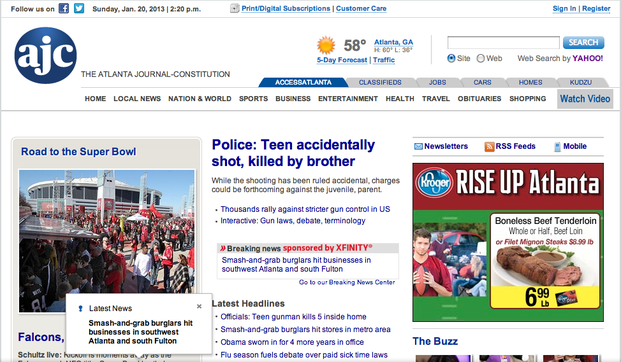When I arrived to my digital journalism class on Wednesday I was looking forward to hearing what my professor, Herbert Lowe, assigned me as a beat for the course of the semester. Previously he had asked each of us our career aspirations to get a better feel for the type of work we should be focusing on. Mine? To be a magazine editor. I figured with the rest of my classmates being assigned a publication within the realm of their own interests that I would be assigned something similar. When "Atlanta Journal-Constitution" came out of Professor Lowe's mouth I was a bit disappointed. If you knew me you would know that a news-heavy daily paper out of Atlanta, Georgia is not my cup of tea.
For tea, I prefer a British breakfast blend. It is reliable, healthy, and it delivers the daily dose of caffine I need. Last semester I was lucky enough to find my favorite blend in the tea capital of the world- England. I spent a semester studying journalism in the UK. My classes focused heavily on the history of journalism and how the BBC came to be one of the most reliable news publications in the world today. After four months of living in a city dominated by rock n' roll listening, cider-drinking, fashion setting junkies, I knew I would have to return. My post-graduation plan is to "hop the pond" back to City University, London and earn a master's degree in International Journalism.
Since I plan to use this blog to showcase my writing, I didn't see how the Atlanta Journal-Constitution could contribute to my acceptance into the International Journalism Program. After class I went up to my professor and briefed him on this issue. He was understanding and graciously assigned me the BBC, which as you can tell is definitely my cup of tea.
Having already been familiarized with the BBC website while in London, it is hard for me to think back to what my first impressions were. When I compared it to other newspapers' websites I found the BBC's homepage to be less busy than others. Unlike the New York Times, the BBC is dominated by more headlines, less words and bigger pictures. The font is not the expected Times New Roman size 8, and the addition of a home-page header slideshow gives the BBC a one-up in my book.
Since I plan to use this blog to showcase my writing, I didn't see how the Atlanta Journal-Constitution could contribute to my acceptance into the International Journalism Program. After class I went up to my professor and briefed him on this issue. He was understanding and graciously assigned me the BBC, which as you can tell is definitely my cup of tea.
Having already been familiarized with the BBC website while in London, it is hard for me to think back to what my first impressions were. When I compared it to other newspapers' websites I found the BBC's homepage to be less busy than others. Unlike the New York Times, the BBC is dominated by more headlines, less words and bigger pictures. The font is not the expected Times New Roman size 8, and the addition of a home-page header slideshow gives the BBC a one-up in my book.
I chose to read an article on President Obama's inauguration to get a better understanding of how the BBC covers U.S. news. One noticable difference was the size of the graphs. In the article, not one of the 17 graphs were more than one sentence long. Having read many BBC articles before, this did not surprise me but it did remind me that the spelling and style of British English differs from American English. Something to keep in mind while I am updating this blog. I like that the writing is straight and to the point, however since I prefer features to news stories, I think there is a lack of voice from the author. On the BBC many of the articles do not include a byline. I personally enjoy knowing who is writing the articles so I can easily access some of their other work and read up on their credentials.
Prior to becoming a journalism student, I knew very little about the BBC. I knew it stood for British Broadcasting Corporation, but I didn't understand the profound impact it had on the lives of Europeans. This semester I look forward to reviewing their articles, critiquing their coverage, and spreading awareness of their site to my followers. And I am happy to say that at first glance, I am already sure the BBC has more depth to it than what I was taught by Austin Powers. Remember this?
Prior to becoming a journalism student, I knew very little about the BBC. I knew it stood for British Broadcasting Corporation, but I didn't understand the profound impact it had on the lives of Europeans. This semester I look forward to reviewing their articles, critiquing their coverage, and spreading awareness of their site to my followers. And I am happy to say that at first glance, I am already sure the BBC has more depth to it than what I was taught by Austin Powers. Remember this?


 RSS Feed
RSS Feed